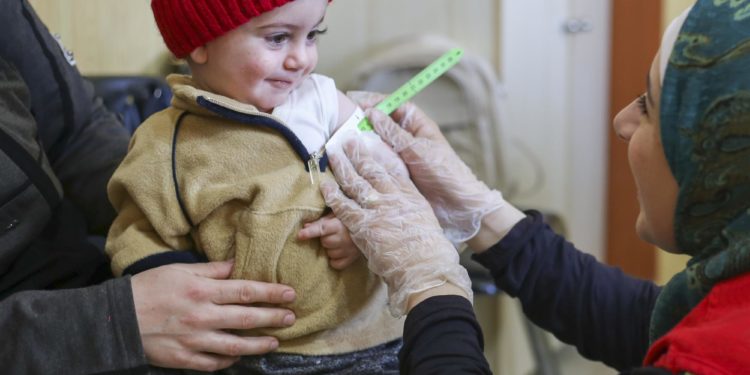Abd al-Rahman was only 9 months old when his mother, carrying his thin exhausted body, arrived in the Syrian Arab Red Crescent clinic in Daraa. Her deep worries appeared clearly on her face were intensified as her baby was diagnosed with severe acute malnutrition without complications (Moak 11.3) by the pediatrician at the clinic that referred him to the malnutrition treatment department.
Quick response to the suffering of the baby
Instantly, the medical specialized volunteers developed a treatment plan and a nutritious diet. He has been given supplements (peanuts butter) for two weeks and improved remarkably. After that, he has been fed with protective supplements (peanuts butter and high-energy biscuit) to ensure stable well-being and protect him against relapses.
Medical follow up and recovery
A visit after a visit, Abdul Rahman was gradually moving towards complete recovery. After 12 weeks, his Moak measured (12,9) thanks to the periodic reviews of SARC Center and treatment follow-up. His mother applied the volunteers’ instructions precisely for 12 weeks. Today, Abdulrahman is pretty recovered as the symptoms vanished and the paleness turned into a rosy smile that filled his mother’s heart with peace.
The Malnutrition & Community Management Department
Six days a week, the Department of Malnutrition and Community Management in the Syrian Arab Red Crescent in Daraa branch receives children (6 months to 6 years old) with nutritional problems and support them with curative and preventive supplements and high energy biscuits, along with constant monitoring of their vital signs related to malnutrition. During the last month (November 2020) the department treated 223 children at the clinic and during field visits.
Malnutrition: its definition, symptoms and treatment
According to the WHO, the term malnutrition refers to a deficiency, increase or imbalance in a person’s energy or nutrient intake. Malnutrition poses a severe threat to the health of the child, especially below the age of two years, affecting growth and physical and mental development. Breastfeeding is considered one of the most important methods that contribute to supporting the child’s immune system and protecting it from malnutrition. Given that breast milk is considered a natural, complete food full of energy and nutrients that the baby needs in its first months. The main symptoms of malnutrition are:
• Tiredness and a lack of energy
• Lack of growth and low body weight
• An inability to concentrate
• A higher risk of getting sick and taking longer to heal
• Lack of appetite or interest in food or drink
If any malnutrition signs are observed, you need to see a specialist doctor and a follow-up on his health condition should be initiated immediately. The sooner is the better in order to avoid the consequences that may lead to various diseases.


